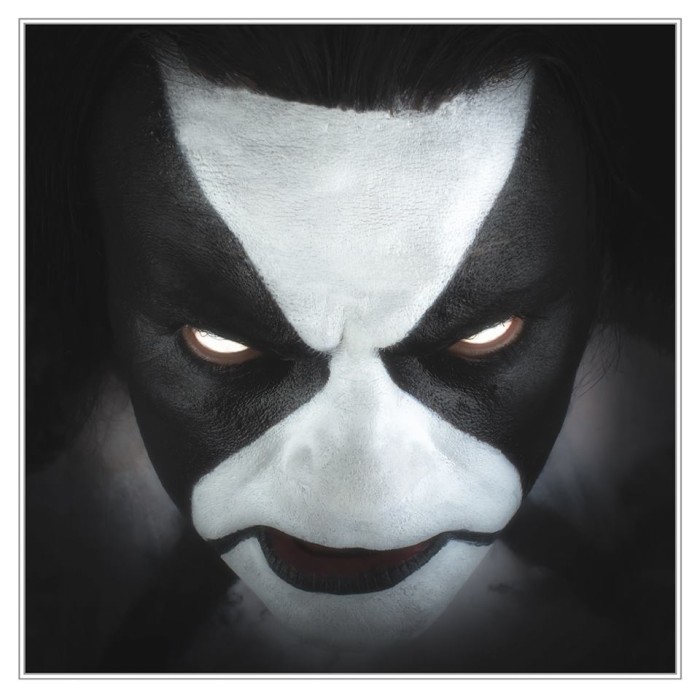
Abbath’s pitfalls on Abbath are garden variety pitfalls (haphazard songwriting, too much time on the mixing consoles). What really distinguishes this album from all the other comebacks (like our recent coverage of Dystopia) is its main author’s legacy. Abbath’s previous accomplishments with Immortal factor very heavily into any promotion of his solo efforts, and this album has already received a great deal of praise because it doesn’t rock the boat by not sounding like Immortal and its more openly rock-like spinoffs (Between Two Worlds, March of the Norse). Divorced from the fame, Abbath might draw a little positive attention for having slightly above average individual riffs and instrument interaction, but that doesn’t stop it from paling in comparison to what Immortal themselves achieved.
A lot of what I could say about this album has already been used to describe previous efforts from when Immortal itself lost the impetus that made it so interesting in its early years. Running a simple search and replace on Brett’s descriptions of Damned in Black to replace band names makes for a very accurate, albeit not particularly original summation of how Abbath falls short. Surprisingly, it also describes some of the strong points; this album is arguably a lot more appealing on a superficial level than Immortal’s earlier studio albums. While skillful organization of musical content makes careful listening to a track like “The Call of the Wintermoon” off the debut pay off in the long run, I will admit that earlier material sometimes falls short in individual riffs and solos, mainly because the band members were less technically skilled in the past. That attention to detail, though, rendered the old works more ambitious. In contrast, a couple of tracks here come off as especially contrived; for instance, “Ocean of Wounds”, which sounds like Abbath and company decided that they absolutely needed to have a mid-paced arena headbanger. Many of the tracks aren’t as obviously pop oriented, but they’re still pretty haphazard and unmemorable once you start memorizing the individual elements.
It should come as no surprise that I don’t exactly recommend Abbath. The main difference between this and most of the chaff is that I think the musicians involved could do better if they set their minds to it based on the fact that they have, although the subtleties of the past sometimes just don’t pay the bills. At the very least, a financially successful but vapid comeback is a different problem than continued effort from bands that never put out anything of value.
Tags: 2016, abbath, Black Metal, death metal, mainstream metal, self-titled


Metal composers need to accept that it is fine to make music about more than one thing,
instead of trying to either
– express and / or describe the same things as they did with their great metal works of the past, despite the inner fire for those things having subsided
or
– Trying to express different things, but forcing it in to the style of metal that they used to write in, which may not be well suited to describe what they want it to.
If you are no longer driven to describe death or hatred, then don’t do it. Describe something else that interests you. And if nothing is of interest, stop making music and get a new job, because music that doesn’t speak of anything profound is not good music.
I am not in favour of switching style for its own sake. I am just against sticking to the same style for its own sake., and against making music for its own sake.
A basic example, not about Abbath but in general: Why use hatred against Christianity as a source of inspiration, when there are fewer reasons to fight that battle now than in the past? The inspiration has to be genuine, and it has to come from within. If you were raped by a priest, raised Christian, or feel strong hatred against the religion for any reason, then go ahead. But don’t pull a charade.
Personally, I think that Islam is more relevant. It is related to Christianity and shares some of its disgusting traits, but it is doing more harm, and it isn’t dying a slow death like Christianity is. Also, Islam is shielded by political correctness, while Christianity really isn’t.
Islam is no less than a dark age religion, still alive and active just as it was back then.
Why keep attacking Christianity when Islam exists? It feels forced and poserish, more inspired by metal tradition than inner drive.
This comment should be an article post! Very well-said, sir.
I am glad to read that.
Nile are doing this more and more with their recent releases.
“Why keep attacking Christianity when Islam exists?”
Because you might keep your head.
I live in Sweden, and we don’t have shariah law here yet.
And the risk of losing one’s head is exactly why islam should be attacked.